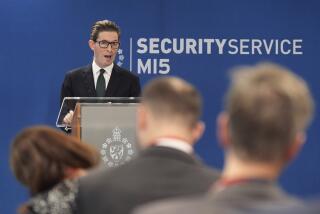More Suspects Sought in Alleged Bomb Plot
- Share via
LONDON — British and U.S. officials warned Saturday against complacency after the arrests of suspects in an alleged plot to blow up passenger jets bound for the United States and said the search continues for more people who might have been involved.
“No one should be under any illusion that the threat ended with the recent arrests. It didn’t. The threat, as well as our efforts, is ongoing,” British Home Secretary John Reid said.
One U.S. intelligence official said that in addition to seeking more suspects, authorities were looking into whether a similar parallel plot might have been in the works.
“Are there concerns that there are more conspirators out there who wish to do us harm? Yes. That has been and continues to be the case; either people connected with this plot or who may have been trying to do something in parallel,” said the official, who spoke on condition of anonymity because of the sensitivity of the investigation.
The U.S. official also confirmed that an alleged plotter in Pakistan sent word to conspirators in Britain, urging them to launch their attacks as soon as possible, apparently after one person was detained in Pakistan.
The authorities continued their search for links between 23 detainees in custody, many of them British natives of Pakistani origin, and at least 11 others, including the brother of one of the suspects, who are being held in Pakistan.
All are suspected of participating in a plot, allegedly nearing its final days, to smuggle liquid explosives aboard U.S.-bound airliners flying out of Heathrow. The Times of London reported Saturday that police were looking at possible links between the detainees and the perpetrators of a series of coordinated bombings on the London transit system in July 2005.
Some of those in custody appear to have visited Pakistan last year at the same time as two of the London bombers, the Times of London reported.
The U.S. official discounted published reports that the alleged plotters had selected a specific date for the attacks, saying intelligence suggested that the date, specific flights and other details were still in flux when the plot was disrupted.
With no new arrests and few revelations about the plot, criticism in Britain began Saturday to focus on Prime Minister Tony Blair’s Middle East policy. Muslim leaders singled out the British government’s participation in the Iraq war and Blair’s failure to call for an immediate end to the fighting in Lebanon.
In an open letter to several newspapers, leaders of the Muslim community in Britain, including six lawmakers, said British foreign policy was “putting civilians at increased risk, both in the U.K. and abroad,” and said the government should focus less on domestic anti-terrorism laws and more on its Mideast policy.
While emphasizing that “attacking civilians is never justified,” the letter said “the debacle of Iraq and now the failure to do more to secure an immediate end to the attacks on civilians in the Middle East not only increases the risk to ordinary people in that region, it is also ammunition to extremists who threaten us all.”
Blair is on vacation, but his office issued a statement saying “nobody could have worked harder” to bring about a cessation of hostilities in the region.
His allies went on the attack, with Transport Minister Douglas Alexander calling such arguments “dangerous and foolish.”
“Frankly, no government worth its salt would allow its foreign policy to be dictated to under the threat of terrorism,” Alexander told the BBC.
“I have no doubt that there are many issues which incite people to loathe government policies, but not to strap explosives to themselves and go out and murder innocent people,” added Foreign Office Minister Kim Howells.
“I think it is very, very dangerous when people who call themselves community leaders make some assumption that somehow there’s a rational connection between these two things,” he said.
But Muslim leaders insisted that the government has too long ignored the political frustrations they said were increasingly driving young British Muslims toward extremism. A recent Times of London poll showed that 13% of British Muslims believed that the suicide bombers who perpetrated the July 2005 attacks were martyrs.
Shahid Malik, a Labor Party member of Parliament from an area that was home to one of the London transit bombers, said Israel’s bombing campaign in Lebanon and Britain’s failure to condemn it were issues of substantial frustration.
“Obviously, I think everybody would condemn Hezbollah and their actions,” he said, “But it’s critically important that we say the actions of Israel, and the relative inaction of us in the West, is contributing to increasing anger and frustration among Muslims in the U.K., in America and across the world,” he said. “And invariably, if you’re angry and frustrated, then you’re more likely to be susceptible to voices that are sinister.”
At the Muslim Council of Britain, Inayat Bunglawala said Saturday’s statement came in response to a clear trend of increasing radicalism among Muslim youths in Britain.
“Whenever we ask about what may have contributed toward younger people turning towards extremist views, we keep hearing back from them that they feel our country’s pursuing hostile policies toward other Muslims overseas,” he said.
Mainstream Muslim organizations have to a degree been in “denial” about the extent of extremism among young British Muslims, Bunglawala said, but “there is also denial amongst the government as to whether some of their own policies may have contributed to undermining our country’s security, and this is hindering our fight against terrorism.”
Murphy reported from London and Meyer from Washington.
More to Read
Sign up for Essential California
The most important California stories and recommendations in your inbox every morning.
You may occasionally receive promotional content from the Los Angeles Times.










